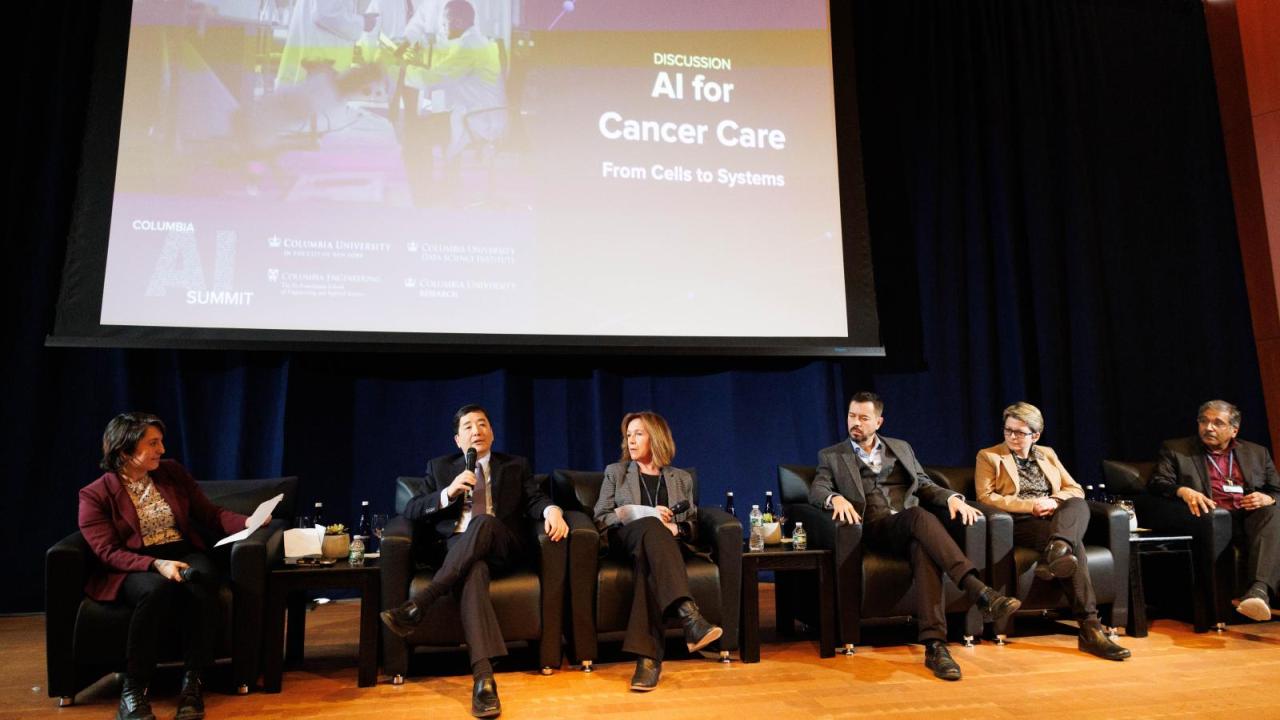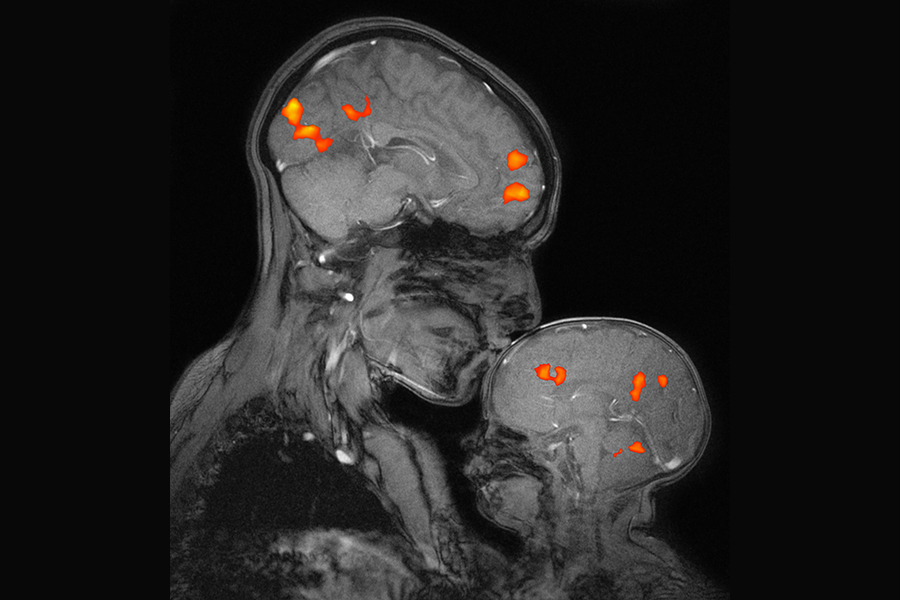DSI and The Patrick J. McGovern Foundation Invite the Next Generation to Imagine Data and AI for Good - DSI
It’s no surprise that the generation poised to enter the technical workforce and lead cutting-edge research sees social issues as a priority. As data science and AI’s reach extends to nearly every facet of life, how can the digital native generation marshal its skills to drive social impact?
To open this discussion to the community, the Data Science Institute (DSI) and The Patrick J McGovern Foundation (PJMF) co-hosted the event Tech-for-Good Careers: A Community-Centered Approach to Data and AI Innovation.
Speaking in a fireside chat about the future of data science and technology with DSI Faculty Co-Director and UChicago Distinguished Service Professor Dan Nicolae, Vilas Dhar, President of The Patrick J. McGovern Foundation, inspired responsibility and optimism: “We’re really good at building amazing things,” Dhar said, but these should be informed by “a commitment to a society founded in equity and justice. The conversation about technology begins with what our society should look like.”
Dhar emphasized the vital role the rising generation of data scientists will play in the direction AI takes: “Ethical AI [is] fundamentally a human function. We are encoding the values of a moment, embedding them in the tools we’re using to analyze the world around us.” He underscored the central place of academic spaces in both leading the conversations about what the future will look like and actively shaping that future, saying: “These are the rooms where that [building] happens.”
The evening’s agenda highlighted ways UChicago faculty, staff, and students are leveraging data science for social good.

The program kicked off with a panel where alumni traced their career journeys. Launa Greer (MSCAPP ’21) spoke about her path as a software engineer working for a consulting firm to working in the social impact space: “I was looking for opportunities to blend tech together with service and policy. [While in graduate school] I took a project-based class with the DSI Data Science Clinic, helping a nonprofit track deforestation caused by the palm oil industry, and it was addictive,” she said. Launa now serves as a staff software engineer at the DSI, partnering with social impact organizations through The 11th Hour Project Software and Data Hub.
Alumni paths ventured beyond traditional engineering roles as well: Andrew Fan (BA ’13), explained how journalism at the Invisible Institute, where he serves as Executive Director, grows out of innovative analyses conducted with direction from community voices. Speaking about the genesis of the Invisible Institute’s 2023 investigation “Missing in Chicago,” which earned a 2024 Pulitzer Prize in local reporting, Fan said, “We didn’t start out with missing persons. We actually found it through data-based inquiry. We created a system where we were looking at huge troughs of police complaints to identify patterns in police handling, teaming with community volunteers to help us understand.”
Kayecee Palisoc (MSCAPP ’24) knew she wanted to apply her skills to structural issues but didn’t know how. As a DSI Community Data Fellow in 2023, Palisoc was able to assist the State of Illinois Commission on Equity and Inclusion’s financial inclusion program. “That was my first exposure to government work,” she said, “and looking back that led me to my current role.” Today, in her work with the City of Chicago’s Department of Technology and Innovation, she serves as a liaison between technical providers and the City.
Alums shared advice for students preparing to enter the workforce fulltime, encouraging students to “try to get into the community and work with organizations to discover their needs.” Greer emphasized that “tech is most effective when it’s really rooted in the needs of the community, rather than the flashy new thing.”
She further advised students to “own your skills development,” and reminded them to leverage the community they build on campus: “You might be the most technical person in your organization,” she said, “but you have a network that extends beyond it that you can draw on.”

Highlighting social impact data and AI case studies, Hazem Mahmoud, Director of Products and Services at PJMF, shared some of the principles the Foundation applies throughout development from ideation to testing, deployment, and maintenance, which included ensuring tools remain people & community-focused, and keeping humans in the loop during production. He presented examples of tools that PJMF has developed with this approach to address needs ranging from access to clean water in refugee camps to financial due diligence tools for grant makers.
Mahmoud emphasized the vital role of data scientists and engineers in 2025: “If you think about tech today, it impacts how we spend our time together, the relationships we have, the values we decide we want to keep as a society, and that’s a huge responsibility.” He encouraged students to meet this challenge proactively by asking questions, educating themselves through coursework in ethics, and advocating in their work to “take the time to contribute to open-source tools that protect users and communities.”

Illustrating the Data Science Institute’s own approach to community-centered data science, Dylan Halpern, Full-Stack Software Engineer at DSI and Susan Paykin, Senior Associate Director of Community-Centered Data Science, presented PalmWatch, a recent social impact data science project. This project began in 2021 when nonprofit Inclusive Development International connected with the DSI, with support from The 11th Hour Project, to quantify the impacts of the palm oil industry on deforestation and hold responsible corporations to account. The DSI team developed scripts to clean, extract, and standardize information from public reports to estimate the area affected by individual mills. The team then packaged these findings into PalmWatch, a public web tool where users can not only examine past impact but also estimate future deforestation risk by mill, company, brand, and country. The DSI has since continued its collaboration with IDI and PalmWatch through work with the Data Science Clinic.

The concluding poster session and reception showcased student-led work in community-centered data science research and applications. Students didn’t shy away from challenges, mapping access to public libraries with an eye to greater equity, and developing natural language models to enable more efficient and ethical institutional purchasing practices.
Another student team trained LLMs to identify problematic loans for BankTrack, an organization that tracks the activity of private banks. One of these students, Jack Sanderson (BS ’27), was inspired to continue exploring the space. He has since focused on AI safety and security and expressed excitement after the event to continue applying frontier technologies to real-world problems.
Community-centered data science is core to the DSI’s mission of research, holistic education, and cross-disciplinary partnerships. Since 2021, the DSI has served as the centralized hub for data science and software for the 11th Hour Project, a program of the Schmidt Family Foundation, which supports nonprofits across its programs in energy, food and agriculture, human rights, indigenous communities, and marine technology. Through this partnership, the DSI hosts its Data Science Clinic, which provides direct support to social impact organizations while offering opportunities to inspire the next generation of public interest data scientists.
The DSI also aims to broaden participation in technical and data science fields. Programming such as the Data Science for Social Impact (DSSI) Summer Experience and Data4All provide rigorous yet supportive research environments for undergraduate and high school students to engage with real-world data science problems.
Overall, Tech-for-Good Careers attracted a diversity of students, with not only data scientists but aspiring data journalists at UChicago and Chicagoland high school students in attendance. As Dhar said in conversation with Professor Nicolae, “In many ways, the students in this room are the ones who are going to architect this space.” If the evening’s engagement was any indication, UChicago students are up to the challenge.












